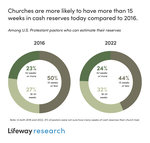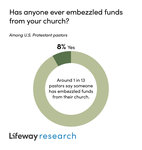


NASHVILLE, Tenn. — Churches are better prepared for financial rainy days than they were prior to the COVID-19 pandemic.
A Lifeway Research study on the financial health of U.S. Protestant churches found more congregations have more than two months of cash reserves compared to a previous study in 2016. Additionally, most churches have undergone a financial audit in the past two years, and fewer than 1 in 10 have had someone embezzle funds from the congregation.
“When hardships impact an organization, financial leaders carefully watch how much cash is on hand and how quickly they are spending it,” said Scott McConnell, executive director of Lifeway Research. “Very rarely does cash stop coming in completely, though some churches experienced that for a few weeks in 2020. But hardships such as a financial recession can impact church receipts and force the use of cash reserves to get by. While improved, there are still too many churches with too little money in the bank given the uncertainties of 2023.”
Prior to 2022, 2016 was the last year a majority of pastors said the economy was having a negative impact on their congregation, according to an annual Lifeway Research study. This time, however, churches seem more equipped to handle the storm.
Nearly one-third of U.S. Protestant pastors are not sure how many weeks of cash reserves their church has. Among those who know, the percentage of churches with less than 16 weeks of reserves has fallen from 50% in 2016 to 44%.
Slightly more churches today have reserves ranging from 16 to 51 weeks. In 2016, 27% said that was the case. Today, 32% have that amount on hand.
Some churches are more likely to have less in the bank than others. African American and Hispanic pastors are more likely than white pastors to say they have less than eight weeks of cash reserves.
Pastors at small and normative-sized congregations are also among the most likely to have little to no reserves. Those at churches with worship service attendance of fewer than 50 and between 50 and 99 say they have seven weeks or less in reserves. Additionally, 1 in 5 pastors at the largest churches, those with 250 or more in attendance, say they have less than two months of cash reserves.
More than half of pastors say they have had a complete audit of their church’s finances within the past two years.
“Some state laws require that nonprofit organizations of a certain size file audited financial statements, but most churches have an option,” said McConnell. “Many congregations prefer to have this review to ensure that financial processes are being followed and that trust is maintained.”
Relatively few pastors say their congregations have had someone embezzle money from them, but still around 1 in 13 churches (8%) have experienced this. The rate is statistically unchanged from 2016 when 9% reported previous embezzlement.
“The misappropriation of funds is more likely when an organization lacks necessary processes so that multiple people are aware of every expenditure before it is made,” said McConnell. “Skipping some of those safeguards and streamlining financial accountability for the sake of ministry may sound easy to justify, but it can be a costly choice for a church.”